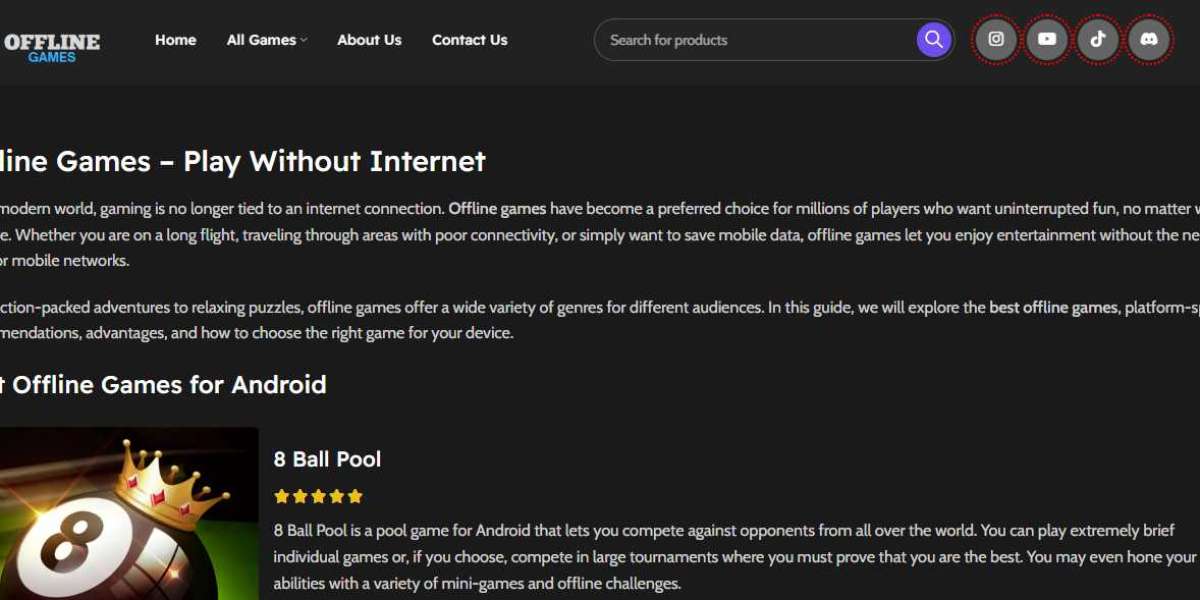In an era dominated by cloud gaming, battle passes, and always-online multiplayer titles, a surprising trend is making waves in the gaming community: the resurgence of offline games. Gamers across the world are rediscovering the charm of self-contained, single-player experiences that require no internet connection and offer no interruptions. From nostalgic throwbacks to modern masterpieces, offline games are once again earning a respected seat at the gaming table.
This article explores why offline games are on the rise, what makes them appealing in 2025, and what this trend means for the future of gaming.
The Over-Saturation of Online Gaming
Over the last decade, online games have been the industry’s dominant force. Battle royales, MMOs, live-service titles, and co-op experiences have turned gaming into a social, connected activity. But as the number of online-only games has ballooned, so has player fatigue.
Many gamers report feeling overwhelmed by:
Constant updates and the need to keep up with meta changes.
Microtransactions, loot boxes, and other monetization schemes.
Server issues and downtime.
Toxic communities in competitive multiplayer environments.
Subscription fatigue, as more platforms adopt battle passes or seasonal content models.
As a result, many players have started to seek refuge in the simplicity of offline games.
Offline Games Offer Creative Freedom
One of the defining characteristics of offline games is that they are typically narrative-driven or sandbox-based. Without the constraints of competitive balance or server-side infrastructure, developers can focus more on storytelling, art design, and immersive world-building.
Take games like The Witcher 3, Stardew Valley, or Celeste—these are offline experiences that provide deep emotional or creative satisfaction. They don’t rely on fast internet speeds, matchmaking queues, or server pings. Instead, they offer:
Rich narratives that unfold without interruptions.
Complete game experiences without post-launch monetization.
Replay value through well-designed mechanics and secrets.
Offline games often prioritize polish and creativity over perpetual engagement. This allows developers to deliver meaningful, crafted experiences rather than endless grinds.
Portability and Accessibility
Another reason offline gaming is making a comeback is due to the rise in portable gaming hardware. Devices like the Steam Deck, Nintendo Switch, and even Android gaming handhelds make it easier than ever to game on the go—whether you're on a plane, in a remote cabin, or just avoiding unreliable internet.
Offline games are ideal for:
Travelers who don't always have access to Wi-Fi.
Students with limited bandwidth on campus.
Commuters who want to game during transit.
Gamers in areas with poor connectivity.
As more gamers embrace the idea of untethered play, offline titles have become the default choice.
Nostalgia and the Retro Gaming Revival
The resurgence of offline gaming is also deeply tied to nostalgia. Retro gaming has seen a huge boom in recent years, with emulators, remasters, and retro consoles helping older gamers revisit their childhoods—and introducing younger gamers to classics from the past.
Franchises like Final Fantasy, Zelda, Mega Man, and Castlevania—many of which started as offline-only games—have found new audiences and renewed popularity.
Furthermore, indie developers are paying homage to older design philosophies. Pixel art, chiptune soundtracks, and turn-based combat are all enjoying a renaissance in modern offline games.
Mental Health and Digital Detox
A growing number of gamers are also recognizing the mental health benefits of stepping away from the always-online lifestyle. With social media burnout, Zoom fatigue, and information overload becoming increasingly common, offline games offer a sanctuary.
These benefits include:
Reduced anxiety from competitive environments.
No distractions from in-game ads or notifications.
More control over time management and session length.
Greater immersion, leading to improved relaxation and escapism.
Games like Journey, Firewatch, or Spiritfarer offer contemplative, peaceful experiences that are best enjoyed in solitude.
Ownership and Longevity
Another major appeal of offline games is true ownership. With online games, players are often dependent on servers remaining active. Once support ends, the game becomes unplayable. Offline games, however, can be preserved indefinitely.
Gamers are starting to realize:
Digital preservation matters—especially as older games disappear from online stores.
Offline titles remain playable regardless of server shutdowns or DRM issues.
Game collecting is easier when the product isn’t tied to online access.
Owning a physical or DRM-free copy of an offline game ensures that players can return to it decades later—something increasingly rare in today’s online-first gaming landscape.
The Indie Game Boom
The rise of offline games also mirrors the success of the indie gaming scene. Independent developers, often lacking the infrastructure for large-scale multiplayer, focus on tight, compelling offline gameplay.
Hit titles like:
Hollow Knight
Hades
Undertale
Disco Elysium
…prove that innovation and emotional depth can come from small teams focused on offline design. These games often experiment with narrative structure, visual style, or mechanics in ways that online games simply cannot.
Offline Doesn’t Mean Outdated
There’s a misconception that offline games are inherently simpler or less impressive than online counterparts. But that’s far from the truth.
Modern offline games can:
Utilize cutting-edge graphics (e.g., Red Dead Redemption 2).
Feature branching narratives with high replay value (e.g., Detroit: Become Human).
Offer hundreds of hours of content without a single server check-in (e.g., Elden Ring, played offline).
Many offline titles also include optional updates or mod support, blending the best of both worlds—classic game structure with modern flexibility.
The Future of Gaming: A Hybrid Approach?
While offline games are gaining traction, this doesn’t spell doom for online gaming. Instead, it signals a desire for balance. Gamers want options. They’re seeking out games that respect their time, offer depth, and let them play without constraints.
The future might lie in hybrid models:
Games that offer optional online features without requiring them.
Titles that prioritize single-player experiences with co-op as a bonus.
Cloud saves and updates, but no mandatory internet check-ins.
This shift may push developers to rethink their reliance on online-only mechanics and return to more grounded, player-first design philosophies.
Conclusion
The resurgence of offline games is more than just a nostalgic trend—it's a reflection of evolving player values. In a world saturated with connectivity, the quiet joy of a solo gaming session is more powerful than ever. Whether it's for the storytelling, the escape, or the simplicity, offline games are proving that sometimes, going back to basics is the most forward-thinking move a gamer can make.
So the next time you're disconnected from the grid, don’t worry. That just might be the perfect time to press play.



